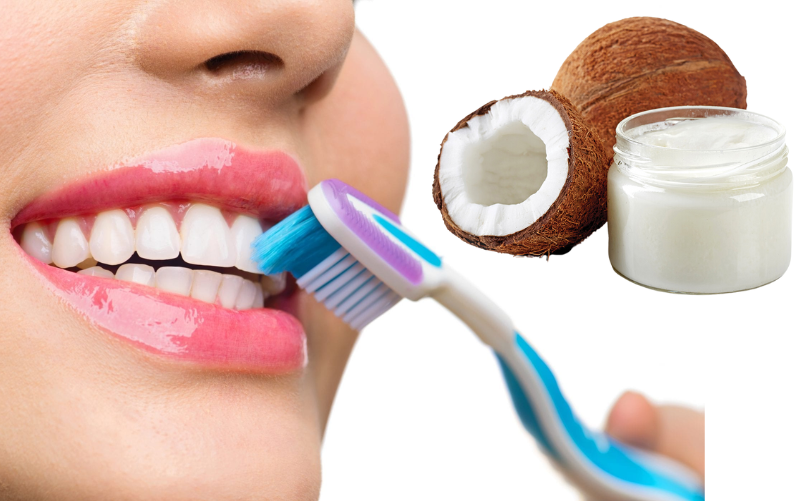1516 Legacy Cir, Naperville, IL 60563
Role of Coconut Oil in Teeth Whitening

A bright, white smile is often associated with health, vitality, and confidence. While there are numerous teeth whitening products and procedures available, many people are turning to natural remedies for a brighter smile. One such remedy that has gained popularity in recent years is coconut oil. In this blog post, we’ll explore the role of coconut oil in teeth whitening and how you can incorporate it into your oral care routine for a brighter, whiter smile.
The Science Behind Coconut Oil Teeth Whitening
Coconut oil, extracted from the kernel of coconuts, has been used for centuries in traditional medicine and oral care. Its effectiveness in teeth whitening is attributed to its unique composition and properties.
Lauric Acid and Microbial Action: Coconut oil is rich in lauric acid, a medium-chain fatty acid known for its antimicrobial properties. Lauric acid can help combat harmful bacteria in the mouth.
Reduction of Streptococcus Mutans: Streptococcus mutans is a type of bacteria commonly found in the mouth. It plays a major role in the formation of dental plaque and tooth decay. Studies have shown that coconut oil pulling can reduce the levels of Streptococcus mutans in the mouth. This leads to improved oral health and potentially whiter teeth.
Anti-Inflammatory Effects: In addition to its antimicrobial properties, coconut oil also exhibits anti-inflammatory effects. Inflammation in the gums can contribute to gum disease and other oral health issues. By reducing inflammation, coconut oil promotes healthier gums and overall oral health.
Enhanced Absorption of Calcium: Calcium is essential for strong, healthy teeth. Some research suggests that the medium-chain fatty acids in coconut oil may enhance the absorption of calcium in the body. As a result, this contributes to stronger teeth and potentially whiter enamel.
How to Use Coconut Oil for Teeth Whitening

Oil Pulling: Oil pulling is a traditional Indian folk remedy that involves swishing oil around in your mouth to improve oral health. To use coconut oil for oil pulling, take a tablespoon of coconut oil and swish it around in your mouth for 15-20 minutes. Spit out the oil (do not swallow it), and then brush your teeth as usual. Oil pulling with coconut oil can help remove bacteria and plaque from your teeth, leading to a brighter smile over time.
Coconut Oil Toothpaste: You can also make your coconut oil toothpaste at home. Mix 2 tablespoons of coconut oil with 1 tablespoon of baking soda and a few drops of peppermint essential oil for flavor. This homemade toothpaste can help whiten your teeth and freshen your breath. Use it like regular toothpaste, brushing for at least two minutes before rinsing thoroughly.
Coconut Oil and Turmeric Paste: Turmeric is known for its anti-inflammatory and antimicrobial properties. Also, when combined with coconut oil, it can create a powerful teeth-whitening paste. Mix 1 tablespoon of coconut oil with 1 teaspoon of turmeric powder to form a paste. Use this paste to brush your teeth, leaving it on for 3-5 minutes before rinsing thoroughly. Be cautious, as turmeric can stain clothing and surfaces.
Coconut Oil Mouthwash: You can also use coconut oil as a mouthwash to freshen your breath and improve oral health. Mix a tablespoon of coconut oil with a few drops of essential oil (like peppermint or tea tree oil) and swish it around in your mouth for 1-2 minutes. Spit it out and rinse your mouth with water.
Benefits of Using Coconut Oil for Teeth Whitening
Natural Whitening: Coconut oil offers a natural alternative to chemical-laden teeth whitening products. It contains no harsh chemicals or additives, making it a gentle option for those with sensitive teeth or gums. Additionally, coconut oil is safe for daily use and can be used as part of your regular oral care routine.
Improved Oral Health: In addition to whitening teeth, coconut oil can also improve overall oral health. Its antimicrobial properties can help reduce the bacteria that cause bad breath, gum disease, and tooth decay. Regular use of coconut oil for teeth whitening may lead to a healthier mouth and gums.
Gentle on Enamel: Unlike some teeth whitening products that can damage tooth enamel, coconut oil is gentle on enamel. This is a safer option for long-term use, as it does not weaken the protective layer of enamel on your teeth.
Cost-Effective: Coconut oil is relatively inexpensive compared to professional teeth whitening treatments or over-the-counter whitening products. A jar of coconut oil can last for several weeks or even months, making it a cost-effective option for teeth whitening.
Easy to Use: Incorporating coconut oil into your oral care routine is simple and convenient. Whether you choose to use it for oil pulling, or in other forms, coconut oil can be easily integrated into your daily routine.
Reduction in Sensitivity: Some teeth whitening products can cause increased tooth sensitivity. Coconut oil, on the other hand, is gentle and may help reduce sensitivity, making it a more comfortable option for those with sensitive teeth.
Promotes Gum Health: The antimicrobial properties of coconut oil can help reduce inflammation and promote gum health. Using coconut oil for teeth whitening may also support the health of your gums, leading to a healthier smile overall.
Potential Side Effects
Gastrointestinal Upset: Some people may experience gastrointestinal upset, such as nausea or diarrhea when first starting to use coconut oil for oil pulling or other oral care practices. This is typically mild and temporary but may occur as your body adjusts to the coconut oil.
Allergic Reactions: While rare, some individuals may be allergic to coconut oil. If you experience symptoms such as itching, rash, or swelling after using coconut oil for teeth whitening, discontinue use and consult with your healthcare provider.
Digestive Issues: In some cases, ingesting coconut oil during oil pulling may lead to digestive issues such as bloating or cramping. If you experience these symptoms, consider reducing the amount of coconut oil used or discontinuing the practice altogether.
Coconut oil offers a natural, safe, and effective way to whiten teeth and improve overall oral health. Its antimicrobial properties can help reduce bacteria in the mouth, leading to fresher breath and a cleaner mouth. Additionally, coconut oil’s ability to remove surface stains can help brighten your smile over time. While coconut oil offers numerous benefits for teeth whitening and oral health, it’s important to be aware of potential side effects such as gastrointestinal upset or allergic reactions. It’s always advisable to consult with your healthcare provider or dentist before starting any new oral care regimen, especially if you have any underlying health conditions or concerns. By harnessing the power of coconut oil, you can not only improve the appearance of your teeth but also promote better oral health for a happier, healthier smile.









